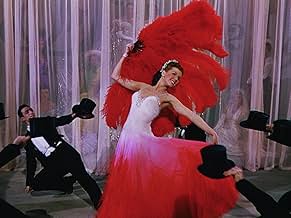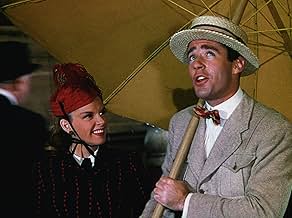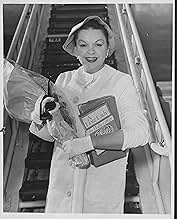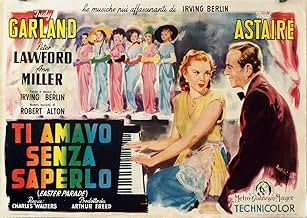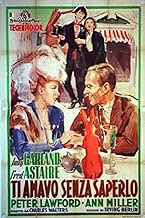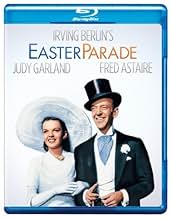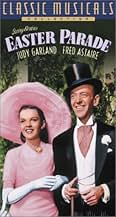NOTE IMDb
7,3/10
11 k
MA NOTE
Ajouter une intrigue dans votre langueA nightclub performer hires a naive chorus girl to become his new dance partner to make his former partner jealous and to prove he can make any partner a star.A nightclub performer hires a naive chorus girl to become his new dance partner to make his former partner jealous and to prove he can make any partner a star.A nightclub performer hires a naive chorus girl to become his new dance partner to make his former partner jealous and to prove he can make any partner a star.
- Récompensé par 1 Oscar
- 2 victoires au total
John Albright
- Western Union Messenger
- (non crédité)
Lola Albright
- Hat Model
- (non crédité)
- …
Don Anderson
- Passerby on Street
- (non crédité)
Shirley Ballard
- Showgirl
- (non crédité)
Norman S. Barker
- Trombone player in bar
- (non crédité)
Jimmy Bates
- Boy
- (non crédité)
Virginia Bates
- Model
- (non crédité)
Margaret Bert
- Florist
- (non crédité)
Lulu Mae Bohrman
- Restaurant Patron
- (non crédité)
Ralph Brooks
- Diner at Rooftop Show
- (non crédité)
Histoire
Le saviez-vous
- AnecdotesGene Kelly was originally scheduled to play Don, but he broke his ankle playing volleyball in his backyard. It was his suggestion that he be replaced by Fred Astaire. Cyd Charisse was up for the role of Nadine, but a torn ligament in either one or both of her knees forced her to drop out. She was replaced by Ann Miller.
- GaffesA Police officer writes Jonathan (Peter Lawford) a ticket for parking beside a fire hydrant. As he hands over the ticket, he bumps the hydrant which wobbles.
- Versions alternativesThere is an Italian edition of this film on DVD, re-edited in double version (1.33:1 and 1.78:1) with the contribution of film historian Riccardo Cusin. This version is also available for streaming on some platforms.
- ConnexionsEdited into Histoire(s) du cinéma: Seul le cinéma (1994)
- Bandes originalesHappy Easter
(uncredited)
Written by Irving Berlin
Performed by Fred Astaire
Performed also by Fred Astaire and Judy Garland
Commentaire à la une
For the only teaming of Fred Astaire and Judy Garland, Gene Kelly had to break an ankle playing touch football although he told the studio it was in rehearsal. So Fred Astaire who after another Irving Berlin musical extravaganza, Blue Skies at Paramount, got pulled out of retirement for this film. It was a happy accident for film fans.
Easter Parade by this time had become the national anthem for Easter and enjoys a grand seasonal popularity as Irving Berlin's White Christmas also. It was originally written for the musical revue As Thousands Cheer in 1933 and sung as a duet by Clifton Webb and Marilyn Miller. Bing Crosby reprised it in Holiday Inn in a very nice number driving a horsedrawn sleigh from church Easter services. But usually when it is presented visually, the clip of Judy Garland singing it in the finale is the one always shown.
By the way the melody originally was for a lyric entitled Smile and Show Your Dimple which bombed for Irving Berlin. Berlin was quoted as saying that popular songs are a perfect marriage between words and music and in this case the melody got divorced and married a second lyric successfully.
Easter Parade is a good mixture of old Irving Berlin material and new songs written for this film. Fred Astaire shines with one of the new ones in Stepping Out With My Baby which is a good followup to Putting On the Ritz which Astaire sang and danced to in Blue Skies. And Judy just shines in Better Luck Next Time.
The plot is a pretty simple one and for the MGM opulence that their musicals were known for their are very few actual speaking roles in this film. It's a romantic quadrangle with Fred Astaire being dumped by his erstwhile partner Ann Miller and then taking on Judy Garland in one of those 'I'll show her' moments of bravado. Peter Lawford's around to get whoever Astaire doesn't.
The acting honors in Easter Parade go to Judy. For all that talent Judy Garland was a most insecure person in life and she drew from that in bringing Hannah Brown to the screen.
Ann Miller's big number is Shaking the Blues Away which Ruth Etting introduced in 1927. Doris Day in fact does it in Love Me or Leave Me. Still Ann makes it more of a dance number than Doris did which is what Irving Berlin originally intended it to be.
The thing about Easter Parade and so many other films like it is that all that talent was contracted to that studio. You can't make a film like Easter Parade today because you'd have to pay full market price for the talent, even as Irving Berlin's numbers slip year after year into public domain.
The Easter parade with women dressed in their finest most tasteful frock is still a New York tradition on Easter Sunday. So is this film.
Easter Parade by this time had become the national anthem for Easter and enjoys a grand seasonal popularity as Irving Berlin's White Christmas also. It was originally written for the musical revue As Thousands Cheer in 1933 and sung as a duet by Clifton Webb and Marilyn Miller. Bing Crosby reprised it in Holiday Inn in a very nice number driving a horsedrawn sleigh from church Easter services. But usually when it is presented visually, the clip of Judy Garland singing it in the finale is the one always shown.
By the way the melody originally was for a lyric entitled Smile and Show Your Dimple which bombed for Irving Berlin. Berlin was quoted as saying that popular songs are a perfect marriage between words and music and in this case the melody got divorced and married a second lyric successfully.
Easter Parade is a good mixture of old Irving Berlin material and new songs written for this film. Fred Astaire shines with one of the new ones in Stepping Out With My Baby which is a good followup to Putting On the Ritz which Astaire sang and danced to in Blue Skies. And Judy just shines in Better Luck Next Time.
The plot is a pretty simple one and for the MGM opulence that their musicals were known for their are very few actual speaking roles in this film. It's a romantic quadrangle with Fred Astaire being dumped by his erstwhile partner Ann Miller and then taking on Judy Garland in one of those 'I'll show her' moments of bravado. Peter Lawford's around to get whoever Astaire doesn't.
The acting honors in Easter Parade go to Judy. For all that talent Judy Garland was a most insecure person in life and she drew from that in bringing Hannah Brown to the screen.
Ann Miller's big number is Shaking the Blues Away which Ruth Etting introduced in 1927. Doris Day in fact does it in Love Me or Leave Me. Still Ann makes it more of a dance number than Doris did which is what Irving Berlin originally intended it to be.
The thing about Easter Parade and so many other films like it is that all that talent was contracted to that studio. You can't make a film like Easter Parade today because you'd have to pay full market price for the talent, even as Irving Berlin's numbers slip year after year into public domain.
The Easter parade with women dressed in their finest most tasteful frock is still a New York tradition on Easter Sunday. So is this film.
- bkoganbing
- 25 juil. 2006
- Permalien
Meilleurs choix
Connectez-vous pour évaluer et suivre la liste de favoris afin de recevoir des recommandations personnalisées
- How long is Easter Parade?Alimenté par Alexa
Détails
- Date de sortie
- Pays d’origine
- Langues
- Aussi connu sous le nom de
- Desfile de Pascua
- Lieux de tournage
- Société de production
- Voir plus de crédits d'entreprise sur IMDbPro
Box-office
- Budget
- 2 503 654 $US (estimé)
- Montant brut mondial
- 733 $US
- Durée1 heure 43 minutes
- Rapport de forme
- 1.37 : 1
Contribuer à cette page
Suggérer une modification ou ajouter du contenu manquant








